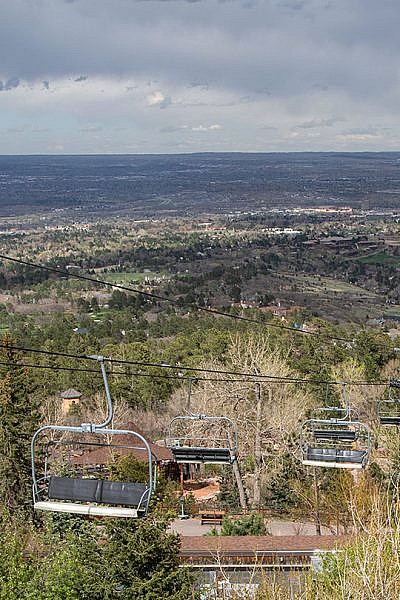As America’s mountain Zoo, we know that our unique setting on the side of Cheyenne Mountain is part of what makes every visit magical. One of our core values is to live with the mountain and to preserve its natural beauty. That means designing exhibits that work with existing terrain and maintaining native plants that thrive and provide our animals with the most naturalistic habitats possible.

It also means using natural solutions to combat naturally-occurring inconveniences, like flies.
“The type of flies we most often deal with are attracted to manure, and we have plenty of that around here,” said Alex Crochet, Cheyenne Mountain Zoo’s horticulture curator. “The manure flies bite, and that makes them pretty pesky. So to help our animals, we have been implementing natural fly eliminators that are safe for our animals, our people, and the beautiful mountain we live on.”
The horticulture team has been introducing parasitic wasps to areas around the Zoo that receive the most fly traffic. The scary-sounding wasps are anything but.
“They’re native to our Rocky Mountain region, so we’re not interrupting the ecosystem, and they’re nocturnal, which means they’ll very rarely be active when our guests are present,” said Crochet. “These wasps don’t sting or bite the animals or us. They’re smaller than the tip of a pencil, but keepers say they’ve noticed the tiny wasps have made a noticeable difference for their animals.”
Crochet and his teammate, Denny Patton, senior horticulture tech, have identified where flies are most prevalent and let the wasp colonies go to work. The wasps are shipped in wood chips, which the team lays out near fly breeding grounds. The gnat-sized burrowing wasps lay their larvae into the fly pupae and when the wasp larvae hatches, it eats the fly pupae. This kills the fly in its pupal form, before it can grow into a bothersome resident at the Zoo.
“We use these in conjunction with sticky fly traps, because the flies will reproduce faster than the wasps can,” said Crochet. “We’re excited about this new solution, because we’re using two nontoxic tools to disrupt the flies’ life cycles. Nature usually knows how best to do things, so we’re using mother nature’s pest control in our natural environment. Permaculture with integrated pest management (IPM) is the way to go.”
The team will introduce a new colony of parasitic wasps every four weeks throughout the spring and summer months. In the fall and winter, when flies aren’t such a nuisance, the wasps will naturally go dormant.
“My whole philosophy is, ‘why fight nature with a harmful chemical when you can fight nature with itself?’,” said Crochet. “We have this beautiful mountainside and our main goal is to preserve that for our animals, guests and the native plants and animals who live here.”

